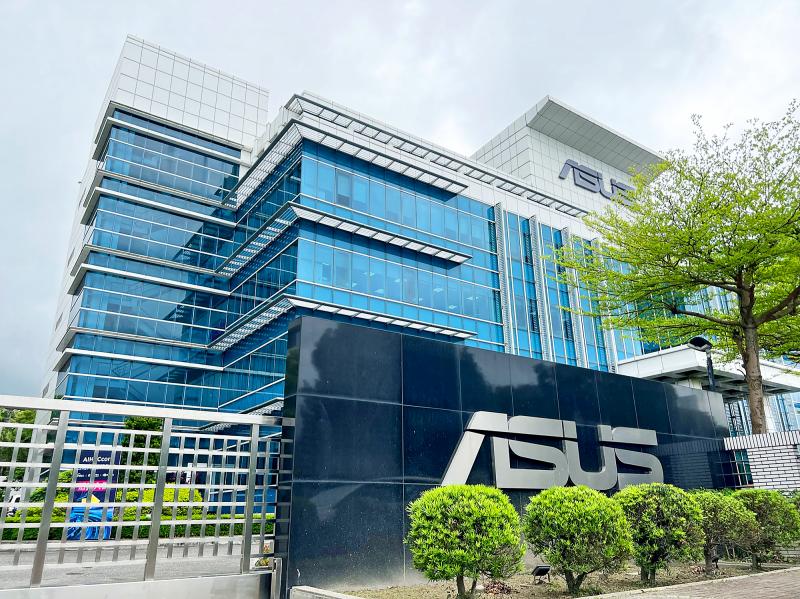Asustek Computer Inc (華碩) yesterday reported a 14 percent sequential decline in net profit to NT$10.43 billion (US$351.1 million) last quarter and forecast that Chinese lockdowns and geopolitical risks in Europe would reduce its PC shipments by 10 percent this quarter.
Shipments of PC-related components, including motherboards and graphics cards, are expected to dip by between 10 and 15 percent sequentially this quarter, the company said.
PCs accounted for 66 percent of Asustek’s total revenue last quarter, while components contributed 33 percent, company data showed.

Photo: CNA
The company, headquartered in Taipei’s Beitou District (北投), also factored in the impact from rising inflation, logistics snarls and flagging consumption prospects.
“The impact of the Russia-Ukraine war is spreading to other countries in Europe due to [rising] energy prices,”Asustek co-CEO Samsun Hu (胡書賓) told an online investors’ conference in Taipei. “In some European countries, electricity bills have surged three times, which is squeezing demand for PCs and other goods. We saw weakening PC momentum in Europe in the past two months.”
COVID-19 restrictions in China, surging inflation and monetary tightening in the US are also dampening demand for PCs, Hu said.
To stimulate demand, Asustek is in discussion with its CPU suppliers and retail partners to launch promotional campaigns, Hu said.
Commenting on key component supply constraints, Hu said chip supply has improved.
With China stubbornly sticking to its “zero COVID-19” policy, shortages of precision electronics and modules have overtaken chips to become the new “gating items,” Hu said.
Asustek said it is cautiously optimistic about the second half of the year, when shipments could pick up due to back-to-school purchases, pandemic-related pent-up demand and the year-end holiday shopping spree.
The company kept its key financial targets for this year unchanged, except for a short-term dip in the current quarter, saying that revenue would increase more than 10 percent annually this year and operating margin would be above 6 percent.
Net profit last quarter fell 14 percent quarter-on-quarter from NT$12.06 billion.
On an annual basis, it expanded 7 percent from NT$979 million.
Earnings per share fell to NT$14 from NT$16.2 in the prior quarter, but rose from NT$13.2 a year earlier.
Operating margin fell to 7.87 percent, compared with 8.69 percent in the previous quarter and 10.69 percent in the same period last year.
To recruit and retain talent, Asustek said it plans to raise employee pay in the first half of the year.
In addition, the company is looking at setting up an employee stock ownership trust this year at the earliest, it said.

RECYCLE: Taiwan would aid manufacturers in refining rare earths from discarded appliances, which would fit the nation’s circular economy goals, minister Kung said Taiwan would work with the US and Japan on a proposed cooperation initiative in response to Beijing’s newly announced rare earth export curbs, Minister of Economic Affairs Kung Ming-hsin (龔明鑫) said yesterday. China last week announced new restrictions requiring companies to obtain export licenses if their products contain more than 0.1 percent of Chinese-origin rare earths by value. US Secretary of the Treasury Scott Bessent on Wednesday responded by saying that Beijing was “unreliable” in its rare earths exports, adding that the US would “neither be commanded, nor controlled” by China, several media outlets reported. Japanese Minister of Finance Katsunobu Kato yesterday also

Taiwan’s rapidly aging population is fueling a sharp increase in homes occupied solely by elderly people, a trend that is reshaping the nation’s housing market and social fabric, real-estate brokers said yesterday. About 850,000 residences were occupied by elderly people in the first quarter, including 655,000 that housed only one resident, the Ministry of the Interior said. The figures have nearly doubled from a decade earlier, Great Home Realty Co (大家房屋) said, as people aged 65 and older now make up 20.8 percent of the population. “The so-called silver tsunami represents more than just a demographic shift — it could fundamentally redefine the

China Airlines Ltd (CAL, 中華航空) said it expects peak season effects in the fourth quarter to continue to boost demand for passenger flights and cargo services, after reporting its second-highest-ever September sales on Monday. The carrier said it posted NT$15.88 billion (US$517 million) in consolidated sales last month, trailing only September last year’s NT$16.01 billion. Last month, CAL generated NT$8.77 billion from its passenger flights and NT$5.37 billion from cargo services, it said. In the first nine months of this year, the carrier posted NT$154.93 billion in cumulative sales, up 2.62 percent from a year earlier, marking the second-highest level for the January-September

‘DRAMATIC AND POSITIVE’: AI growth would be better than it previously forecast and would stay robust even if the Chinese market became inaccessible for customers, it said Taiwan Semiconductor Manufacturing Co (TSMC, 台積電) yesterday raised its full-year revenue growth outlook after posting record profit for last quarter, despite growing market concern about an artificial intelligence (AI) bubble. The company said it expects revenue to expand about 35 percent year-on-year, driven mainly by faster-than-expected demand for leading-edge chips for AI applications. The world’s biggest contract chipmaker in July projected that revenue this year would expand about 30 percent in US dollar terms. The company also slightly hiked its capital expenditure for this year to US$40 billion to US$42 billion, compared with US$38 billion to US$42 billion it set previously. “AI demand actually